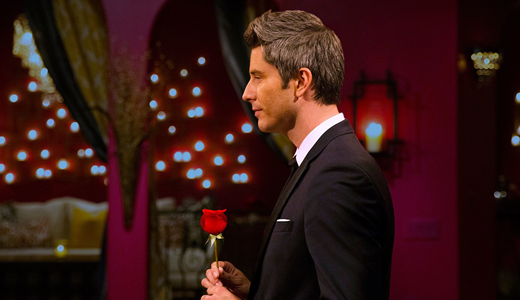In a culture sometimes infatuated with transgressing norms, it’s hard to do something that’s so far out of bounds, morally speaking, that virtually everyone condemns it. But this season’s finale for The Bachelor earlier this week may have accomplished that rare feat.
Here’s what happened and why people are so mad about it: This season’s bachelor, racecar driver Arie Luyendyk Jr., proposed to one contestant, Becca Kufrin, then dumped her on TV in order to propose to the runner-up, Lauren Burnham. And, boy howdy, did the Twitterverse let him know what it thought about that choice.
Now, we might argue that the highly produced “reality” dating show has always manipulated and sometimes misused its contestants. (More on that below.) Even so, many voices are condemning ABC’s attempt to use Luyendyk’s flip flop as a ratings ploy. Slate’s Willa Paskin wrote an article titled, “The Bachelor Finale Achieved New Heights in the Art of Commodifying Suffering,” where she observes, “The show brought a cruel and unusual new innovation to the field of amazingly awful television.” Others penned similarly condemning headlines. USA Today writer Justin Kirkland wondered, “Is It Time to Stop Watching The Bachelor?”
But The Daily Beast’s Samantha Allen suggests it’s exactly this kind of emotional train wreck that perennially lures viewers back for more: “The Bachelor is an abyss of meaning, vacant but transfixing. I don’t doubt that Becca K.’s heartbreak is genuine. But she is just one more spurned contestant who, in all likelihood, will go on to become the Bachelorette, collect a five-to-six figure check, and start a failed relationship of her very own. The cycle will continue, nothing will change, and I will still watch.”
Before we move on to some real news, though, the New York Post’s Page Six pop culture section reveals that Bachelor producers go to incredible lengths to manufacture drama—up to and including the exploitation of its female participants’ monthly cycles for the sake of catching emotional footage.
Elsewhere this week, it seems like there was an awards show or something … oh, that’s right, the Oscars! Before Hollywood’s biggest night officially got underway, the pre-show red carpet event was marked by dramatic speculation about which nominees would avoid Ryan Seacrest, who’s currently mired accusations of sexual harassment by a former stylist. Turns out a lot of them did, including all five nominees for Best Actress. Ratings for E!’s pre-show red carpet special plunged 43%, while the Oscar broadcast itself dropped 16% from last year, which itself was a nine-year low.
Winners this year included the explicit human-merman love story The Shape of Water (Best Picture), as well as Frances McDormand (Best Actress, Three Billboards Outside Ebbing, Missouri) and Gary Oldman (Best Actor, Darkest Hour). McDormand was the focus of one of the evening’s signature moments when she asked all the female nominees to stand and made an impassioned plea for every actress to have an “inclusion rider,” which NPR defined this way: “It’s a stipulation that actors and actresses can ask (or demand) to have inserted into their contracts, which would require a certain level of diversity among a film’s cast and crew.”
Other Oscar-oriented news includes another conservative critique of the deeply problematic same-sex, adult-teen love affair in Call Me by Your Name. Meanwhile, those titular billboards in rural Missouri are spawning plenty of real-life imitations of that film’s unique protest strategy.
Moving on, there’s so much other news related to teens and pop culture this week that we need to launch into a Culture Clips “speed round” to capture it all:
First up, the Parents Television Council has published its latest study, “Violence, Gun Violence, and TV Content Ratings on Prime-Time Broadcast Television,” which examines how this influential medium might be contributing to our nation’s epidemic of youth violence.
Next, Frozen 2 director is hinting that Elsa may have a girlfriend in the upcoming sequel, a development many fans (including Idina Menzel herself) are actively rooting for and supporting online.
In the category of life imitating art, a newly discovered interview with Psycho star Janet Leigh (from 1984!) includes the revelation that the iconic shower scene in that Hitchcock classic forced her to swear off taking showers for the rest of her life. (She replaced them with baths, presumably sans a shower curtain.)
Sexting—the practice of taking a sexually oriented selfie or writing explicit texts—continues to become more common among teens, with the journal JAMA Pediatrics reporting that 27.4% of teens have received such a text.
Elsewhere in young adult news, a poll of 1,000 18- to 25-years found that they spend an average of more than six hours a day feeling “stressed out.”
The director for Disney’s highly anticipated film A Wrinkle in Time describes her big-screen adaptation as a “love letter” to black girls, though some early reviews suggest that the film’s minimization of Madeline L’Engle’s Christian themes from the book will rankle many fans.
Some conservative observers are concerned that Twitter is censoring pro-life messages on that platform.
Finally this week, the Force may not be with Star Wars much longer—the musical force behind the franchise, that is. Famed composer John Williams, who’s also given us the memorable themes for movies such as Raiders of the Lost Ark, Jaws, E.T. the Extra-Terrestrial and Jurassic Park (among many other films) has announced that his score for the forthcoming Star Wars: Episode IX will be his last for the storied sci-fi series. Thanks for four decades of such memorable music, Mr. Williams.






Recent Comments